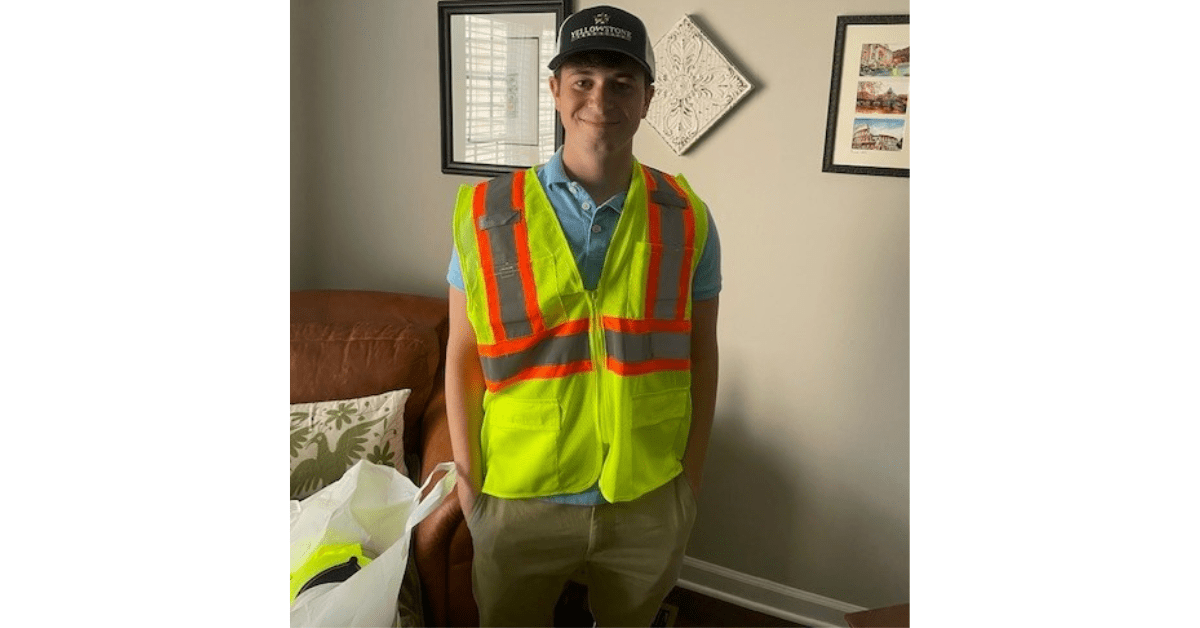
It’s common for college students to seek a summer job between semesters and this was the case for Brennan Wood, a student at the University of Arizona.
Wood also happens to be NALP’s CEO, Britt Wood’s son, so he was encouraged to pursue a job in the landscape industry. Wood ended up working a summer job from May 23, 2022, to August 8, 2022, at Yellowstone Landscape’s Sterling, Virginia, branch.
“I expected that it was going to be really hard, and I was mostly right,” Wood says. “But it definitely got easier as it went on. One thing that I heard a lot and something that ended up being very true was that the first week is the hardest week.”
Wood says he also expected to gain a unique experience, meet some interesting people and learn a lot about stuff he’d never done before.
His days started at work at 6:50 a.m., where he would check in with his crew leader and help load up the truck for the day’s work, whether it be plants, mulch or equipment. Branch president Michael Weiss went out of his way every morning to come out and greet every person in the yard.
Wood says Weiss knew everyone’s name and Wood’s name even before he started working there. He says the branch president helped get him energized for the day.
“It was just a really, really welcoming work environment,” Wood says. “They did a really good job of just making me feel like I was safe, making me feel like I was cared for, and making me feel like it was okay if I wasn’t great all the time.”
Working on crews that varied from two to four other people, Wood would do everything from weeding to mulching and installing flowers. He says every Tuesday, he did regular maintenance work such as edging and watering plants at a government base.
When it came to tasks like planting flowers, they worked until they got everything done, resulting in 14 to 15-hour days at times. Wood says he wasn’t accustomed to working such long hours, which was an adjustment.
On his first day, he was tasked with digging out bushes, and he says it was much harder than he expected. He could tell he was frustrating one of his team members who didn’t speak English because of how slow he was working at the time.
“If it was machine-related and if it could possibly harm my safety to not know what was going on, I would be taught,” Wood says. “Otherwise, it was kind of trial by fire.”
By the end of the season, Wood felt he was getting close to working at the same speed and ability as the others on his team. He says the main thing he learned from the job is it isn’t as hard as everyone makes it out to be, and the employees are not intimidating.
“They’re all really nice people,” Wood says. “You can find the fun in everything.”
Wood says he particularly enjoyed times when if he was doing a tedious job such as mulching or weeding with another coworker, he would get to talk to them about their lives or learn bits and pieces of Spanish.
“You’re multitasking and learning at ton while also hands-on learning a ton,” Wood says. “I always thought that was cool that I was getting so much more out of the day than just the work.”
During the summer, Wood also got to work with some of Yellowstone’s returning H-2B workers, who fit right in once they arrived.
“It was really cool to learn about how all that works, but also just to see how good they are at the job. It was like, ‘Oh, new people! Maybe I won’t be the slowest,’ and then I still was the slowest,” Wood laughs.
He says the language barrier with some of the Spanish-speaking employees was an issue at first because he understood so little Spanish, but after a while, he was able to pick up on specific words. One other crew member would point at things and say them in Spanish and then Wood would figure out the English word for the same object.
Wood says he never felt underestimated or that people assumed he wasn’t capable of doing certain jobs. He says they had faith in him to help as much as he could and knew he’d eventually learn everything.
He definitely recommends other people his age try out working for a landscaping company, but he suggests trying out a part-time position first, as a full-time job is demanding. While the work was tiring, Wood says he is thankful for what he did and what he learned from the job.
He says you gain a lot of hands-on experience, meet a lot of different people and can make a good amount of money over the summer.
“It’s a lot better to have something like that to put on your resume than lifeguarding or working at Panera,” Wood says.
He encourages other landscape companies to make these positions more presentable to younger generations by being upfront about what exactly the job entails.
“I know for a lot of people, and especially me included, just hearing the hours and hearing you’re mostly going to be working with people who may not speak English and stuff like that makes it a lot more intimidating than it needs to be,” Wood says.

